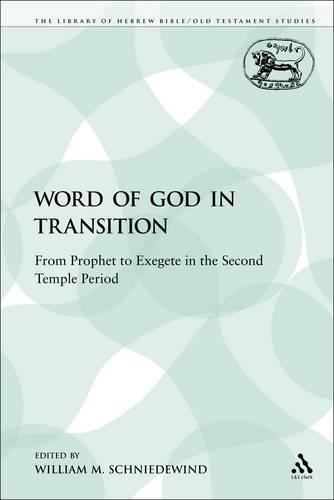
The Word of God in Transition: From Prophet to Exegete in the Second Temple Period
(Paperback, NIPPOD)
Publishing Details
The Word of God in Transition: From Prophet to Exegete in the Second Temple Period
By (Author) William M. Schniedewind
Bloomsbury Publishing PLC
Sheffield Academic Press
1st November 2009
NIPPOD
United Kingdom
Classifications
Professional and Scholarly
Non Fiction
Christianity
Criticism and exegesis of sacred texts
222/.6015
Physical Properties
Paperback
275
Width 156mm, Height 234mm
Description
The Chronicler distinguishes between "traditional prophets" and "inspired messengers", and thereby highlights a radical transition in the meaning of the "word of God" which takes place in the post-exilic period. The Chronicler summarizes his perspective in 2 Chron. 36.16, saying that Israel rejected "his prophets", "the messengers of God", and "his word" (i.e. Torah). This distinction is reflected in the forms and functions of prophetic speech in the books of Chronicles. Thus, the prophets speak to the king, and the inspired messengers (e.g. priests, levites) speak to the people. The prophets interpret narrative events for the king; they explain how God acts. The inspired messengers exhort the people, admonishing them how they should act. The prophets' speeches usually do not use any kind of inspiration formula, but the inspired messengers' speeches are prefaced with possession formulas. These possession formulas are not typical of classical prophecy and mark the rise of a new kind of prophecy, namely, the inspired interpretation of texts. These inspired messengers are thus forerunners of the inspired interpreters of scripture in Qumran, early Christianity and Judaism.
Author Bio
William Schniedewind is Assistant Professor, Biblical Studies and North-West Semitic Languages, Department of Near Eastern Languages and Cultures, University of California, Los Angeles.
